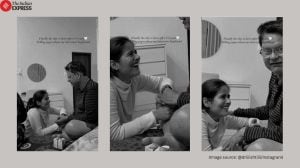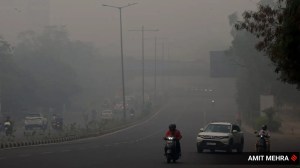NTA NEET UG 2022 Exam Analysis: Easy, but lengthy; experts predict increase in cut-off
NTA NEET UG Exam Analysis: While Physics and Chemistry were rated to be easy, Botany and Zoology sections had slightly lengthy and complicated questions this year.
 Candidates said the NEET UG 2022 exam was comparatively easier than last few years. (Representative image. Express photo)
Candidates said the NEET UG 2022 exam was comparatively easier than last few years. (Representative image. Express photo)NTA NEET UG Exam Analysis: The National Testing Agency (NTA) conducted the National Eligibility-cum-Entrance Test (NEET-UG) 2022 on July 17. This year, a total of 1872341 candidates registered and 95 per cent were present for the exam at their allotted exam centre. While candidates were earlier worried about getting less preparation time, they breathed a sigh of relief after looking at the question paper.
Candidates said the NEET UG 2022 exam was comparatively easier than in the last few years. “The Physics exam was quite easy this year, and the questions were expected. Overall, the exam was easy too,” Ritakshi, who appeared for the NEET UG exam in Ludhiana, told The Indian Express. Another aspirant from Ludhiana, Aryan Ahuja said the exam was “quite easy, especially the Physics section as the questions were predictable. The Chemistry section was average”.
Saurabh Kumar, Chief Academic Officer at Vidyamandir Classes, explained that the Physics section was easy because “some questions were very straightforward”.
The Chemistry section was also rated to be easier than last year. “It can be ranked one or two points higher than last year’s exam. It included questions from all chapters in Chemistry. There were six questions statement-based questions and two were assertion reason questions. This was unusual as last year there were only two statement-based questions,” said Saurabh Kumar.
“Most questions are based on NCERT statements, facts, and tables, so much so that statements were directly copied from NCERT without any changes. Additionally, the question paper is dominated by theory-based questions, having only 11 numerical. This year, Assertion Reason type of questions have been introduced in section A, and such questions demand deep clarity of concepts to answer correctly,” said Anurag Tiwari, national academic director, medical at Aakash BYJU’S.
Meanwhile, the Botany paper was quite lengthy as many questions were long statement based making it time-consuming. This section was rated moderate to difficult, even though a majority of the questions were from NCERT, claims Tiwari.
In the Zoology paper, the questions were majorly statement-based and largely out of the NCERT syllabus. “The objective questions also had the presence of statements this time. The exam was easy to moderate, although a few questions could have tricked the candidates. However, this section was time taking, unlike last year,” Saurabh Kumar explained.
Overall, the paper was rated to be easy to moderate, and thus some experts are predicting an increase in this year’s cut-off list. Increase in number of candidates who appeared for the exam can also lead to increase in the cut-off list this year. “Marks expected to secure a seat in Government Colleges (All India Quota) would have been similar to the previous year (2021) i.e, 580 to 610. As this time the number of students who attended the exam were nearly 19 lakhs which is 18 per cent (approximately) higher than the previous year, hence expected marks might range from 590 to 620,” said Sarvesh Chaubey, Deputy Regional Director at Aakash BYJU’S.
\
Errors in NEET UG
This year, experts have pointed out that the NTA has made some errors in the NEET UG exam. In the Botany section, two questions have been raised to be incorrect, belonging to Living World and Anatomy of flowering plants. In Chemistry section, one question may have a typing error, leading to no match for the correct answer. Similarly, one question in the Physics section, based on the photoelectric effect, had controversial language wherein stopping potential values were interchanged.
“In some questions, Hindi translation was not provided. In one question, all the options were correct. In such a situation, there is a possibility of getting bonus points,” observed Brajesh Maheshwari, Director of Allen Career Institute. “Similarly, in another question, the answer was not in the option.”
- 01
- 02
- 03
- 04
- 05































